|
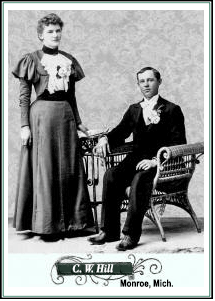 The couple rented a farm just east of 8861 Dixon Rd. known later as the Albert Adler farm for one year. Then they moved to another rented farm on South Custer (later owned by John Eby). The couple rented a farm just east of 8861 Dixon Rd. known later as the Albert Adler farm for one year. Then they moved to another rented farm on South Custer (later owned by John Eby).
A short time later, they bought the place next to it (later owned by August Albright) and after 12 years of marriage, on William’s 35th birthday on April 1, 1909, the couple bought 8861 Dixon Rd. The farm was later sold to their youngest son, William Frank Heiden, on September 28, 1960.
William Carl and Mary (Rambow) Heiden spent a long and challenging life together. By the time of her death in 1963, they had been married for over 66 years and had raised 13 children. The first child was born when Mary was 20 and her last child came at the age of 49 so they spent all of their adult life raising children. That
was just how they seem to have wanted it because they always enjoyed having children and grandchildren around the house.
Their first six children were born at home on various rented farms during the first years of their marriage between 1897 and 1909. Edna, Carl, Leo, Lester, Hilda and Mildred were all born at the homes on South Custer Road or the Wakefield place. Six of the remaining seven children were born at 8861 Dixon Road after it was purchased in 1909. The last child, Norma "Jeanie" Jean, was the only child born in the hospital.
William Carl Heiden was a farmer all his life but he also held other jobs along the way. Most notably was that of a carpenter. He was involved with many barn raisings and was noted for his skills at figuring out how the complicated maze of beams and timbers would all fit together. Some nights before a particularly complicated project, he would lie awake mentally going over the calculations to be sure they were all correct.
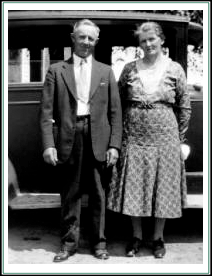 The Heiden family never had a lot of money in those days but they always had enough to get along. They raised much of their own food on the farm and could always go out to the chicken house for a couple of fryers for Sunday dinner. As was the case in most German households, they always had plenty of sausages and preserved foods. Mettwurst was a favorite which was prepared in the family’s own smokehouse located behind the house. The Heiden family never had a lot of money in those days but they always had enough to get along. They raised much of their own food on the farm and could always go out to the chicken house for a couple of fryers for Sunday dinner. As was the case in most German households, they always had plenty of sausages and preserved foods. Mettwurst was a favorite which was prepared in the family’s own smokehouse located behind the house.
Mary (Rambow) Heiden was, by all accounts, an excellent cook and baker. The taste of her homemade bread was eagerly anticipated by everyone in the family. Several times a week, she would bake bread and fill the house with the enticing aroma. Once in a while, she would haul the old kettle up from the basement and make fresh donuts or “long johns” for the family. The children returning from school could always tell that she had been baking as soon as they walked in the door. Many of them can remember that sweet fragrance to this day. Fortunately, she passed many of her skills and recipes on to her children and grandchildren.
The family always maintained a large garden where they could harvest fresh vegetables throughout the summer and for canning. The old Michigan cellar beneath the house was well stocked with shelves of canned goods and big crocks with pickles soaking in the brine. There were also generally a few barrels of hard cider and wine brewing down there too.
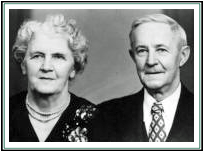 The old house was big and roomy but it could also be cold and drafty in the dead of winter. It was heated by a wood or coal burning furnace in the basement and all the cooking was done on a big wood burning stove in the kitchen. The old house was big and roomy but it could also be cold and drafty in the dead of winter. It was heated by a wood or coal burning furnace in the basement and all the cooking was done on a big wood burning stove in the kitchen.
Life was not all work for them, however. “Ma and Pa” each had favorite activities of their own and both enjoyed just having a good time with family and friends. Both of them loved to play cards and there was often a hot game of euchre going at the dining room table whenever someone dropped over for the evening. There was always a friendly competition between them to see who was the better player.
 Pa was never far from his corn cob pipe. As a young man, he often smoked a cigar but in his later years, he spent many hours puffing leisurely on his pipe while sitting on the front porch or swaying on the swing under the tree. Grandchildren were often allowed to fill the pipe for him while he was busy concentrating on a euchre hand. Pa was never far from his corn cob pipe. As a young man, he often smoked a cigar but in his later years, he spent many hours puffing leisurely on his pipe while sitting on the front porch or swaying on the swing under the tree. Grandchildren were often allowed to fill the pipe for him while he was busy concentrating on a euchre hand.
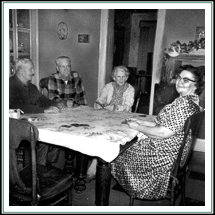 He was a self-taught accordion player who could play many a tune on his “squeeze box.” At least one son, Art, carried on the tradition playing songs “by ear” while other sang or danced to the tunes. He was a self-taught accordion player who could play many a tune on his “squeeze box.” At least one son, Art, carried on the tradition playing songs “by ear” while other sang or danced to the tunes.
On nice summer days, he could often be found fishing down on the banks of the
River Raisin which border the north edge of the farm. He would sit for hours watching a bobber float in the river off the end of a long cane pole. Grandchildren would come along to watch but they always had to be quiet to avoid scaring the fish away.
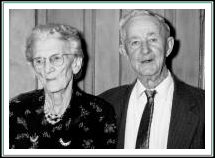 Sometimes, Pa’s old friend, Bill Cominess, would come from his place across the river on North Custer Road and they would fish together. More often, they would wind up at the dining room table playing cribbage. They used old match sticks for pegs and would be heard counting, “15-4, 15-5" as they added up the score. Sometimes, Pa’s old friend, Bill Cominess, would come from his place across the river on North Custer Road and they would fish together. More often, they would wind up at the dining room table playing cribbage. They used old match sticks for pegs and would be heard counting, “15-4, 15-5" as they added up the score.
Both Ma and Pa were fans of the Detroit Tigers. They would listen to games on the radio and in later years watch them on T.V. Although Ma was always busy caring for the house, she found time to become a devoted fan of some of the radio “soap operas” of the day and did not like to miss her “stories” very often.
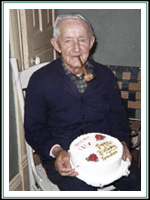 Unfortunately, life was not always fun for the Heidens. They suffered their share of sadness and heartache over the years. In 1939, their sixth child, Mildred, died of complications of a pregnancy. She was only 31 years of age. Her husband, John and infant daughter, Sally, came to live with Ma and Pa for several years after that until they could get back on their feet. Unfortunately, life was not always fun for the Heidens. They suffered their share of sadness and heartache over the years. In 1939, their sixth child, Mildred, died of complications of a pregnancy. She was only 31 years of age. Her husband, John and infant daughter, Sally, came to live with Ma and Pa for several years after that until they could get back on their feet.
Although things were fairly stable on the farm, the years of the Great Depression took their toll on many of the family members. Several of William Carl and Mary’s children found themselves having to come back home for short periods during those years when times were tough.
By our count, 32 different people lived at 8861 Dixon for varying amounts of
time over the decades. Fortunately, they knew that they would always be welcomed in times of need. | 


